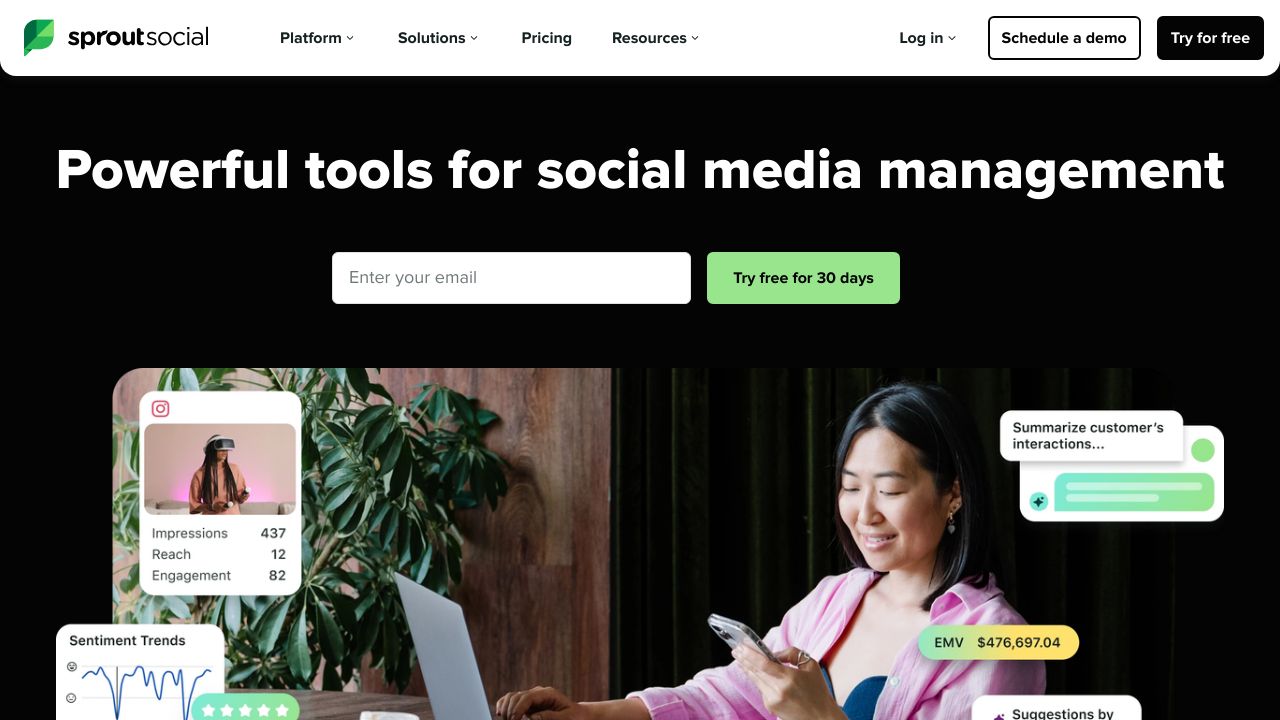AI content creation has exploded across marketing teams. According to Sprout Social's research, 71% of social marketers have already integrated AI and automation tools into their workflows. But creating AI content is just the beginning.
The real challenge? Figuring out if your AI-generated posts actually work.
Traditional content analysis methods don't always capture the nuances of AI-generated material. You're dealing with content that might lack the human intuition behind topic selection, emotional resonance, or cultural context. This means you need different benchmarks, different expectations, and sometimes different metrics entirely.

Setting realistic performance expectations becomes crucial. AI content often excels at consistency and volume but might struggle with authenticity markers that human audiences subconsciously recognize. Understanding these trade-offs helps you measure success more accurately.
Essential Metrics to Track for AI-Generated Content
Not all metrics matter equally when you're analyzing AI content performance. Here's what actually moves the needle.
Engagement Metrics That Actually Matter
Click-through rates tell you if your AI content hooks readers effectively. But don't stop there. Time on page reveals whether people stick around once they click. AI content sometimes suffers from high bounce rates because it can feel generic or miss emotional connection points.
Social shares and comments provide deeper insight into content resonance. AI-generated posts might get fewer organic shares initially, but they can perform well in structured campaigns with clear calls-to-action.
Quality of engagement matters more than quantity. Look for meaningful comments, not just emoji reactions. AI content that sparks genuine discussion typically indicates successful topic selection and execution.
SEO Performance Indicators
Organic traffic growth shows whether search engines value your AI content. Many AI tools excel at keyword optimization, so you might see faster initial rankings compared to human-written content.
Search intent alignment becomes critical. AI sometimes misses subtle intent signals that experienced writers catch naturally. Monitor whether your content actually answers what searchers want, not just what keywords suggest.
SERP visibility and featured snippet captures can be strong suits for AI content, especially for informational queries where structure and comprehensiveness matter more than personality.

Conversion and Business Impact Metrics
Lead generation rates from AI content often surprise teams. While the content might feel less personal, clear value propositions and logical flow can drive solid conversion rates.
Customer acquisition cost through AI content typically runs lower due to production efficiency. Track this carefully because it's often where AI content shows its biggest advantage.
ROI measurement becomes more complex with AI content. Factor in both the reduced creation time and any potential brand impact from less personalized messaging.
Step-by-Step Guide: How to Analyze Content Performance
Here's exactly how to analyze content performance for your AI-generated posts, broken into manageable phases.
Phase 1: Data Collection and Preparation
Start by tagging all AI-generated content in your analytics system. Use consistent labels like 'AI-generated' or 'human-written' in your content management system. This seems obvious, but many teams skip this step and regret it later.
Set up tracking for both standard metrics and AI-specific indicators. You'll want baseline measurements from before you started using AI tools. If you don't have historical data, establish benchmarks using your first month of AI content.
Configure your analytics tools to segment AI content performance. Google Analytics 4 custom dimensions work well for this, or use UTM parameters for social media posts.
Phase 2: Performance Comparison Analysis
Compare your AI content directly against human-created content using the same time periods and distribution channels. This eliminates seasonal or platform-specific variables that might skew results.
Look at industry benchmarks, but take them with a grain of salt. AI content performance varies dramatically by industry, audience, and content type. B2B technical content might perform differently than consumer lifestyle posts.
Document performance differences by content format. AI-generated listicles might outperform human ones, while AI-generated personal stories might underperform. These patterns help optimize your content mix.
Phase 3: Identifying Patterns and Insights
Analyze trends over time rather than focusing on individual post performance. AI content often improves as you refine prompts and processes, so early poor performance doesn't predict future results.
Look for seasonal variations in AI content performance. Some topics work better with AI during busy periods when human writers might rush, while others need human insight during sensitive times.

Identify which content types work best with AI generation. Educational content, product descriptions, and structured how-to guides often perform well, while opinion pieces and personal narratives might struggle.
Phase 4: Optimization Recommendations
Translate your data insights into specific content strategy improvements. If AI content gets good traffic but poor engagement, focus on improving emotional connection through better prompts or human editing.
Create feedback loops between performance data and content creation. Share top-performing AI content examples with your team to identify successful patterns and replicate them.
Develop hybrid approaches based on your findings. Maybe AI handles research and structure while humans add personality and examples. Or perhaps AI creates first drafts that humans heavily edit for voice and tone.
Top Tools for AI Content Performance Analysis
The right analytics tools make all the difference when tracking AI content performance. Here's what actually works in practice.

Native Platform Analytics
Google Analytics 4 remains the foundation for most content analysis. Set up custom events to track AI content specifically, and use the enhanced measurement features to understand user behavior patterns.
Social media platform insights provide valuable engagement data. Facebook Business Manager, Twitter Analytics, and LinkedIn Campaign Manager all offer detailed performance breakdowns that help identify which AI content resonates with different audiences.
Built-in CMS analytics from platforms like WordPress or HubSpot give you content-specific metrics without additional setup. These often integrate well with AI content creation workflows.
AI-Powered Analytics Tools
Sprout Social offers AI-driven insights that help analyze social media performance with automated reporting and trend identification. Their Tag Performance Reports let you categorize AI content and measure specific campaign effectiveness.
BuzzSumo excels at content performance analysis and competitive research. You can track how AI-generated content performs compared to trending topics in your industry.
Specialized AI content analysis tools are emerging rapidly. These platforms often provide sentiment analysis, readability scores, and brand safety metrics specifically designed for AI-generated content.
SEO and Content Intelligence Platforms
SEMrush and Ahrefs provide comprehensive SEO performance tracking that's essential for AI content analysis. Their keyword tracking and content gap analysis features help identify where AI content succeeds or falls short.
Content intelligence platforms like ContentKing monitor technical SEO factors that AI content might miss, such as proper schema markup or internal linking patterns.
Custom Dashboard Solutions
Google Data Studio (now Looker Studio) lets you create consolidated dashboards that combine data from multiple sources. This becomes crucial when you're tracking AI content across different platforms and channels.
Tableau and similar visualization tools help identify patterns in large datasets that might not be obvious in standard reports. This is particularly valuable for teams producing high volumes of AI content.
Ready-to-Use Reporting Templates
Effective reporting templates save time and ensure consistency in your AI content analysis. Here are the essential formats you need.
Executive Summary Dashboard Template
Leadership needs high-level KPIs without getting lost in granular data. Your executive dashboard should focus on business impact metrics.
Metric | AI Content | Human Content | Variance |
|---|---|---|---|
Traffic Growth | 25% | 18% | +7% |
Conversion Rate | 3.2% | 3.8% | -0.6% |
Cost per Lead | $45 | $67 | -$22 |
Content Volume | 150 posts | 75 posts | +100% |
Include trend indicators and brief explanations for significant variances. Executives want to understand the 'why' behind the numbers, not just the data itself.
Detailed Performance Analysis Template
Content teams need granular metrics to optimize their AI content strategy. This template should include engagement depth, content quality indicators, and performance by content type.
- Page views and unique visitors by content type
- Average time on page and bounce rate analysis
- Social engagement metrics (shares, comments, saves)
- SEO performance (rankings, click-through rates, impressions)
- Conversion funnel performance from content to action
Break down performance by distribution channel, content format, and topic category. This granularity helps identify specific optimization opportunities.
Comparative Analysis Template
Side-by-side comparisons between AI and human content reveal strengths and weaknesses clearly. Structure these reports to show performance across multiple dimensions simultaneously.
Include context about content creation time, cost, and resource allocation. Sometimes AI content performs slightly worse but delivers much better ROI when you factor in production efficiency.
Advanced Analytics Techniques for AI Content
Basic metrics only tell part of the story. Advanced analytics techniques reveal deeper insights about AI content performance.
Cohort Analysis for AI Content Performance
Track how AI content performance changes over time by grouping content published in the same period. This reveals whether your AI content creation process is improving and identifies seasonal patterns.
Cohort analysis also shows user behavior patterns. Do people who first discover your brand through AI content behave differently than those who find human-written content first? This insight affects your content strategy significantly.
Attribution Modeling for Multi-Channel AI Content
AI content often works differently in the customer journey compared to human content. It might excel at top-of-funnel awareness but struggle with bottom-funnel conversion content.
Use multi-touch attribution models to understand how AI content contributes to conversions across different touchpoints. This prevents undervaluing AI content that assists conversions without being the final click.
A/B Testing Frameworks for AI Content Optimization
Systematic testing helps optimize AI content performance over time. Test different AI prompts, content structures, and human editing levels to find what works best for your audience.
Focus on testing elements that AI can easily modify: headlines, introductions, call-to-action placement, and content length. These tests often yield actionable insights quickly.
Implementation Roadmap and Best Practices
Rolling out comprehensive AI content performance analysis requires careful planning and realistic expectations.
Building Your Analytics Infrastructure
Start with basic tracking before adding sophisticated analysis. Ensure your team can consistently tag and categorize AI content before implementing complex attribution models or predictive analytics.
Assign clear roles for data collection, analysis, and reporting. Someone needs to own the process, or important insights get lost in busy schedules and competing priorities.
Establish regular review cycles that align with your content production schedule. Monthly deep dives work well for most teams, with weekly check-ins on key metrics.
Common Pitfalls and How to Avoid Them
Don't expect AI content to perform identically to human content immediately. Set realistic benchmarks and focus on improvement trends rather than absolute performance comparisons.
Avoid over-optimizing for metrics that don't align with business goals. High engagement doesn't always translate to business value, especially if the engagement comes from controversy or confusion.
Resist the temptation to abandon AI content after poor initial results. Most teams see significant improvement after refining their processes and prompts based on performance data.
Future-Proofing Your AI Content Analytics
AI content creation tools evolve rapidly, and your analytics approach needs to adapt accordingly. Build flexible tracking systems that can accommodate new content types and distribution channels.
Stay informed about emerging metrics and measurement techniques specific to AI content. The field is developing quickly, and early adopters of new analytics methods often gain competitive advantages.
Consider how privacy regulations and platform changes might affect your ability to track AI content performance. Diversify your measurement approaches to avoid over-reliance on any single data source.
The key to successful AI content performance analysis isn't just collecting data. It's building systems that turn insights into better content strategy decisions. Start with the basics, measure consistently, and refine your approach based on what you learn.

